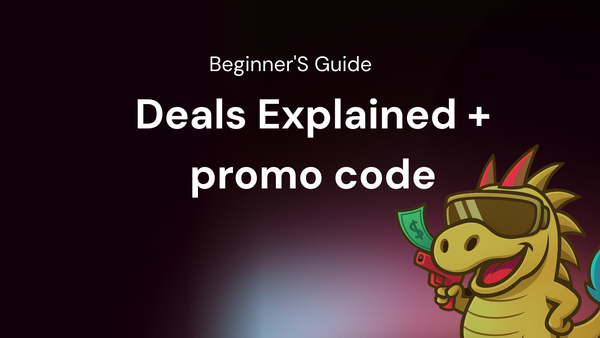Tips & Tricks: Save Big on e-learning platforms Using discounts

Tips & Tricks: Save Big on E-Learning Platforms Using Discounts
In today's rapidly evolving world, continuous learning is no longer a luxury but a necessity. Whether you're aiming to upskill for a career change, delve into a new hobby, or simply expand your knowledge base, e-learning platforms offer an accessible and convenient route to achieving your goals. However, the costs associated with these platforms can sometimes be a barrier. Fear not! This article delves into a comprehensive guide on how to strategically leverage discounts and other cost-saving methods to unlock the full potential of e-learning without breaking the bank. We're not selling you anything here; we're just equipping you with the knowledge to make informed and budget-friendly decisions.
I. Understanding the E-Learning Landscape and Its Costs
Before diving into the discount strategies, it's crucial to understand the landscape of e-learning platforms and the factors contributing to their pricing.
- Variety of Platforms: The e-learning market is diverse, ranging from general platforms like Coursera, edX, and Udemy, which offer courses across various disciplines, to specialized platforms focusing on specific skills such as coding (Codecademy, freeCodeCamp), design (Skillshare, Domestika), or business (LinkedIn Learning, Harvard Business School Online).
- Pricing Models: E-learning platforms employ various pricing models, including:
- Subscription-based: Provides access to a library of courses for a recurring monthly or annual fee.
- Per-course: Charges a one-time fee for individual courses.
- Freemium: Offers a limited selection of free courses or content, with the option to upgrade to a paid plan for more features and courses.
- Cohort-based: Programs that run with a group of students, usually over a few weeks or months, focused on practical experience and interaction.
- Factors Influencing Course Costs: Several factors influence the price of an e-learning course or subscription:
- Instructor Expertise: Courses taught by renowned experts or industry leaders often command higher prices.
- Course Depth and Breadth: More comprehensive and in-depth courses tend to be more expensive.
- Platform Reputation and Brand: Established platforms with a strong reputation may charge a premium.
- Accreditation and Certification: Courses leading to accredited certifications or professional credentials often come with a higher price tag.
- Production Quality: High-quality video production, interactive elements, and supplementary materials can contribute to the overall cost.
- Level of Support: Courses that provide personalized support, mentorship, or community forums may be priced higher.
II. Unveiling Discount Strategies: Your Guide to Affordable Learning
Now, let's explore the core of this article: practical strategies to secure discounts and save money on e-learning platforms.
A. Leveraging Promotional Periods and Sales
E-learning platforms frequently offer promotional periods and sales events throughout the year. Keeping an eye out for these opportunities can result in significant savings.
- Seasonal Sales: Many platforms offer discounts during major holidays such as Black Friday, Cyber Monday, Christmas, New Year, and back-to-school season. Mark your calendar and subscribe to platform newsletters to receive timely updates.
- Anniversary Sales: Some platforms celebrate their anniversary with special discounts and promotions.
- New Course Launches: To attract early adopters, platforms often offer introductory discounts on newly launched courses.
- Platform-Wide Sales: Keep an eye out for periodic sales events where the entire platform offers discounted access to its course library or subscriptions.
How to Find Them:
- Platform Newsletters: Subscribing to the newsletters of your preferred e-learning platforms is the most direct way to receive information about upcoming sales and promotions.
- Social Media: Follow platforms on social media (Facebook, Twitter, LinkedIn, Instagram) to stay updated on their latest offers.
- Deal Websites and Forums: Websites and online forums dedicated to deals and discounts often compile information on current e-learning promotions. (Search phrases like "e-learning discounts reddit" or "online course deals" on Google).
- Coupon Extensions: Browser extensions like Honey or Rakuten can automatically search for and apply available coupon codes when you're browsing e-learning platform websites.
B. Exploring Free Course Options and Trials
Many platforms offer free courses or free trial periods, allowing you to sample the content and platform features before committing to a paid subscription or individual course.
- Free Courses: A substantial number of e-learning platforms offer a selection of free courses, often covering introductory topics or providing a preview of paid content. These free courses can be a great way to assess your interest in a subject and evaluate the platform's teaching style. Platforms like Coursera, edX, and Udemy offer a large selection of free courses. Search for "[Platform Name] free courses" on Google to quickly find them.
- Free Trials: Some platforms offer free trial periods, typically ranging from a week to a month, granting access to their full course library or a selection of paid courses. This allows you to explore the platform's offerings and determine if it aligns with your learning goals. Be sure to cancel your subscription before the trial period ends to avoid being charged.
- Audit Option: Coursera offers an "audit" option on many of its courses. This allows you to access the course content (videos, readings) for free, but you won't be able to submit assignments or earn a certificate.
C. Utilizing Scholarships and Financial Aid
Several e-learning platforms and organizations offer scholarships and financial aid programs to help students overcome financial barriers to education.
- Platform-Specific Scholarships: Some platforms, such as Coursera and edX, offer financial aid or scholarships to learners who demonstrate financial need. The application process typically involves providing information about your financial situation and writing an essay explaining your educational goals.
- External Scholarships: Explore external scholarship opportunities offered by organizations and foundations that support online learning. Search for scholarships related to your field of study or target demographic (e.g., scholarships for women in STEM, scholarships for veterans).
- Government Funding: In some countries, government agencies offer funding or subsidies for online education programs. Research whether such programs are available in your region.
How to Find Scholarship Programs:
- Platform Website: Check the "Financial Aid" or "Scholarships" section on the e-learning platform's website.
- Scholarship Search Engines: Utilize online scholarship search engines like Sallie Mae, Scholarship America, or Fastweb to identify relevant opportunities.
- University Websites: If you're pursuing an online degree or certificate through a university, check their website for scholarship opportunities specifically for online students.
D. Exploring Bundle Deals and Subscription Packages
Opting for bundle deals or subscription packages can often be more cost-effective than purchasing individual courses.
- Course Bundles: Some platforms offer bundles of related courses at a discounted price compared to purchasing each course separately. This is a great option if you're interested in learning multiple aspects of a particular subject.
- Subscription Plans: Subscription plans provide access to a wide range of courses for a recurring monthly or annual fee. If you plan to take multiple courses over a period of time, a subscription can be a more economical choice. Analyze your learning needs and compare the cost of individual courses versus a subscription to determine the best option.
- Group Subscriptions: Some platforms offer group subscriptions for organizations or teams, providing discounted access to their course library for multiple users. If you're part of a company or group that is interested in online learning, explore group subscription options.
E. Seeking Out Employer Sponsorship and Reimbursement Programs
Many employers offer tuition reimbursement or sponsorship programs to encourage employees to pursue professional development.
- Tuition Reimbursement: Check with your HR department to see if your employer offers tuition reimbursement for online courses or programs that are relevant to your job or career goals.
- Employer-Sponsored Training: Some employers directly sponsor online training programs for their employees, often through partnerships with e-learning platforms.
- Professional Development Budget: Inquire whether your company has a budget allocated for professional development activities, which can be used to cover the cost of online courses or subscriptions.
How to Find Out About These Programs:
- HR Department: Your HR department is your primary resource for information about employer-sponsored education programs.
- Employee Handbook: Review your employee handbook for details on tuition reimbursement and professional development policies.
- Company Intranet: Check your company intranet for announcements about training opportunities and educational partnerships.
F. Considering Open Educational Resources (OER)
Open Educational Resources (OER) are freely available educational materials that can be used, adapted, and shared without cost.
- MIT OpenCourseWare: MIT OpenCourseWare provides free access to course materials from over 2,500 MIT courses, covering a wide range of subjects.
- OpenLearn: OpenLearn, from The Open University, offers free courses and resources on various topics, including science, technology, social sciences, and humanities.
- Khan Academy: Khan Academy provides free educational resources, including videos and practice exercises, covering subjects from math and science to history and art.
Finding OER Resources:
- OER Repositories: Search OER repositories such as OER Commons, MERLOT, and Open Textbook Library.
- University Websites: Many universities publish open educational resources on their websites.
- Google Search: Use specific search terms like "[subject] open educational resources" to find relevant OER materials.
G. Negotiating for Discounts (Yes, It's Possible!)
While not always successful, negotiating for a discount, especially for high-value courses or subscription plans, can be worth a try.
- Contact Customer Support: Reach out to the e-learning platform's customer support team and inquire about potential discounts or special offers.
- Mention Competitor Pricing: If a competitor is offering a similar course or subscription at a lower price, mention this to the platform and see if they are willing to match or beat the price.
- Bulk Purchase Discount: If you're planning to purchase multiple courses or subscriptions, inquire about bulk purchase discounts.
- Loyalty Discount: If you're a returning customer, ask if they offer any loyalty discounts for existing users.
III. Beyond Discounts: Maximizing Value and Return on Investment
Securing a discount is only one part of the equation. To truly maximize your savings, it's essential to choose courses wisely and ensure you get the most out of your learning experience.
A. Defining Clear Learning Goals
Before enrolling in any course, clearly define your learning goals. What specific skills or knowledge do you hope to acquire? Having clear objectives will help you select courses that align with your needs and avoid wasting money on irrelevant content.
B. Reading Reviews and Course Descriptions Carefully
Thoroughly research courses and instructors before enrolling. Read reviews from previous students to get an idea of the course quality, teaching style, and overall learning experience. Pay close attention to the course description to ensure it covers the topics you're interested in and meets your skill level.
C. Utilizing Platform Features and Resources
Take full advantage of the features and resources offered by the e-learning platform. This includes:
- Discussion Forums: Participate in discussion forums to interact with instructors and fellow learners.
- Supplementary Materials: Utilize supplementary materials such as downloadable resources, practice exercises, and quizzes.
- Office Hours: Attend virtual office hours or Q&A sessions with instructors to ask questions and clarify concepts.
D. Practicing and Applying Your Knowledge
Learning is not passive; it requires active participation and application of knowledge. Don't just passively watch videos or read materials. Engage with the content, complete exercises, and apply your new skills to real-world projects.
E. Building a Learning Community
Connect with other learners to share ideas, collaborate on projects, and provide support. Building a learning community can enhance your learning experience and provide valuable networking opportunities.
F. Tracking Your Progress and Measuring Results
Monitor your progress and measure the results of your learning efforts. Are you achieving your learning goals? Are you seeing tangible improvements in your skills or knowledge? Tracking your progress will help you stay motivated and identify areas where you need to focus your efforts.
IV. Choosing the Right Platform: A Checklist for Informed Decisions
With numerous e-learning platforms available, selecting the right one can be daunting. Consider these factors when making your decision:
- Course Catalog: Does the platform offer courses in the subjects you're interested in?
- Instructor Quality: Are the instructors reputable experts in their fields?
- Pricing Model: Does the pricing model align with your learning needs and budget?
- Platform Features: Does the platform offer features that enhance your learning experience, such as discussion forums, interactive exercises, and mobile access?
- User Reviews: What do other learners say about the platform and its courses?
- Accreditation and Certification: Does the platform offer accredited courses or certifications that are recognized in your industry?
- Career Services: Does the platform offer career services, such as resume workshops or job placement assistance?
- Trial Period: Does the platform offer a free trial period so you can try it out before committing?
V. Final Thoughts: Embracing Lifelong Learning on a Budget
E-learning platforms offer a powerful and accessible way to acquire new skills and knowledge. By strategically leveraging discounts, exploring free resources, and choosing courses wisely, you can unlock the full potential of online learning without breaking the bank. Remember that continuous learning is an investment in your future. Embrace the opportunity to expand your horizons, enhance your skills, and achieve your personal and professional goals. Happy learning!




